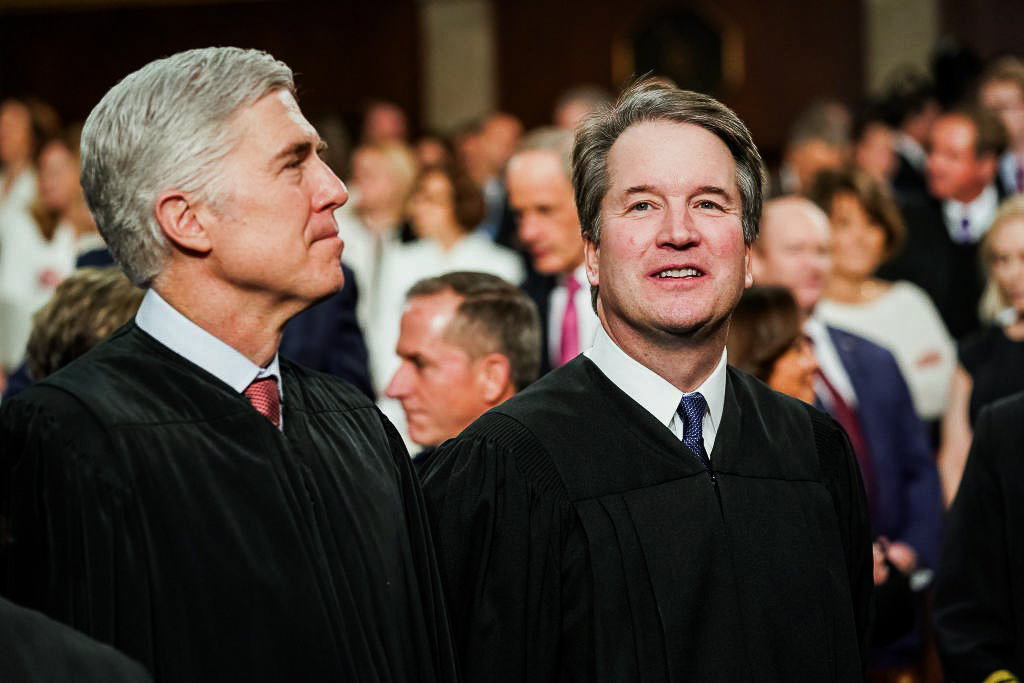The Supreme Court on June 30 turned down a challenge to a California animal welfare law banning the sale of pork from hogs unless the animals were raised in a space that exceeds industry norms.
The voter-approved California law applies to all pork, regardless of where it was produced. A group challenging the law had argued that it harmed farmers and consumers nationwide and could lead to supply chain disruptions.
The Supreme Court rejected a similar challenge to the law in 2023.
The new ruling in Iowa Pork Producers Association v. Bonta took the form of an unsigned order. The court did not explain its decision.
Justice Brett Kavanaugh dissented from the court’s decision not to accept the appeal. He did not explain why.
The law at issue, California Proposition 12, the Farm Animal Confinement Initiative, was approved by state voters in 2018.
Proposition 12 banned the confinement of “breeding pigs and their immediate offspring in areas with less than 24 square feet of usable floor space per pig.”
Before that, in 2008, California voters approved Proposition 2, the Prevention of Farm Animal Cruelty Act. That measure outlawed confinement of pregnant pigs “in a manner that does not allow them to turn around freely, lie down, stand up, and fully extend their limbs.” The law did not forbid the sale of food that came from animals confined in prohibited ways.
The Iowa Pork Producers Association (IPPA) sued California over Proposition 12 in November 2021 in Fresno Superior Court in California. Later that month, the case was transferred to federal district court. IPPA filed a motion for a preliminary injunction to block the enforcement of Prop 12.
In February 2022, the district court denied the motion and dismissed the lawsuit. IPPA appealed to the U.S. Court of Appeals for the Ninth Circuit, which ruled in favor of California, according to the petition filed on Jan. 3.
The IPPA challenged the constitutionality of Proposition 12 because “it requires pig farmers—in any State—to raise breeding pigs using vague and arbitrary housing techniques that conflict with traditional and time-tested farming practices used for generations to feed the Nation,” according to the petition.
“California’s prescribed housing techniques are untethered to the reality of farming and lack any scientific support, yet their enforcement would leave the entire pork supply chain in a state of emergency, inflicting irreparable harm on farmers, processors, retailers, and pork consumers nationwide,” the petition reads.
The petition noted that the law was previously challenged unsuccessfully at the Supreme Court.
In May 2023, the nation’s highest court voted 5–4 to uphold the state law in a case known as National Pork Producers Council v. Ross.
“Companies that choose to sell products in various States must normally comply with the laws of those various States,” Justice Neil Gorsuch wrote for the majority at the time.
“Assuredly, under this Court’s dormant Commerce Clause decisions, no State may use its laws to discriminate purposefully against out-of-state economic interests.”
The dormant commerce clause is a legal doctrine that prevents states from discriminating against out-of-state businesses engaged in interstate commerce.
“But, the pork producers do not suggest that California’s law offends this principle,” Gorsuch said.
Instead, the pork producers asked the court to develop new, more aggressive restrictions on states’ ability to regulate goods that are sold within their borders, he wrote.
“While the Constitution addresses many weighty issues, the type of pork chops California merchants may sell is not on that list,” the justice wrote.
The petition states that the current challenge to the law is different from the previous challenge because the National Pork Producers Council made its arguments solely under the Supreme Court’s dormant commerce clause precedents. The council did not argue that Proposition 12 discriminated “against out-of-state farmers and in favor of in-state farmers.”
However, in the current petition, the IPPA argues that Prop 12 is discriminatory and may also be challenged under other parts of the Constitution, such as the due process clause.
If the Supreme Court were to deny this petition, the court would be endorsing the idea that one state may regulate the industry of another state based “on its own sense of what is moral,” according to the petition.
Eventually, this could lead to “incentivizing tit-for-tat trade wars among State legislatures,” the petition states.
California urged the Supreme Court to reject the petition in a brief filed on April 11.
Proposition 12 will probably lead to higher pork prices for consumers in California, but that is not “the kind of harm that the dormant Commerce Clause is intended to prevent,” according to the brief.
The brief rejected the IPPA’s argument that California farmers—as opposed to out-of-state farmers—had “unfair lead time” to prepare for the enforcement of Proposition 12 because Proposition 2, which regulates how pigs may be housed, took effect years earlier.
This does not constitute “economic protectionism,” the brief states, as California has a “tiny” in-state pork industry and the state “imports almost all of the pork it consumes.”












